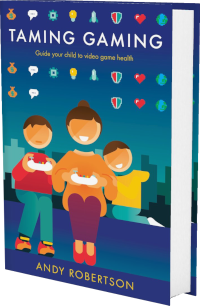 Android
Android iOS
iOS Mac
Mac Switch
Switch Wii
Wii Wii U
Wii U PC
PC PS4
PS4 PS5
PS5 Xbox One
Xbox One Xbox X|S
Xbox X|S17/06/2021 08:45:47 2 years ago Author: Andy Robertson
Understanding the role that video games have in a child’s life not only clears space for parents and carers to guide them towards healthy habits but uncovers the benefits that video games have to offer.
Children aren’t stupid. They don’t play video games just because they’re exciting, easy to access and what their friends are doing. They play because of a range of benefits that, being children, they can’t fully articulate.
Listening to how my kids (now 11, 14 and 16 years old) talk about video games is like a foreign language. Even when they were younger I didn’t understand everything they said, but the bits I did understand were often surprising and fascinating.
They rarely talk about how thrilling games are or how amazing they look. Instead, they tell me how good it is to escape the day for a while and find some order. They light up, discussing the excitement of thinking deeply about new strategies and then being able to perfect them. Their friends come up in these chats in the same way they do when describing the latest playground game. They talk about support and advice they get from more experienced players. And when I still look confused, they take me by the hand and show me video clips of their victories, web pages they’re using to research strategies, and other players they watch online.
I love these conversations. They are a rare opportunity to hear the inner workings of my children’s hearts and minds. Not just what they are getting from the games they play, but how these experiences sit within the rest of their life.
Playing games with our children moves the conversation beyond them explaining their games to us as an outsider, to the easy candour of a shared experience. Taking the step of playing together while you talk brings a further understanding as guards are dropped and more is revealed about why your child loves this game.
This creates a powerful context for children to benefit from the games they play. By being interested and present in our children’s gaming, we can stitch these experiences – the thinking, conversations and interactions that come with them, the ‘infinity group’ as Gee calls it – into family life.
In the past, game-positive voices have suggested benefits from gaming such as transferable skills and cognitive advancement. But there is mixed evidence for whether hard skills like hand–eye coordination, problem-solving or quick reactions transfer to other parts of life. What’s more, looking to these secondary aspects of video gaming to justify the time spent on it misunderstands what video games really have to offer – like justifying the time spent gazing at a beautiful painting based on what it teaches you about history, or enthusing about a novel because of the words you learned.
The real benefit of video games is found in the innate nature of the games themselves. Games are a new media that we are only just starting to understand. But as we scratch the surface of what video games are, as I do in more depth in Chapter 6, we start to get a better picture of what these benefits look like.
Games create an endless variety of spaces to play in. They can be deeply social or intricately complex, they can challenge you with competition or collaboration, let you escape yourself, confront you with questionable decisions you’ve made, frustrate your best efforts; or even soothe you into relaxation and calm. Sometimes they can do many of these things all at once. ‘Games are where I can unfold,’ is how my daughter describes it.
Then there are the benefits that arise as ‘collateral learning’, as Johnson puts it, from the hard work required to succeed. ‘Games force you to decide, to choose, to prioritize. All the intellectual benefits of gaming derive from this fundamental virtue, because learning how to think is ultimately about learning to make the right decisions: weighing evidence, analyzing situations, consulting your long-term goals, and then deciding.’
My children’s school homework books display a diagram of a compass. It’s split into four areas: wisdom, community, compassion and courage. For wisdom it lists planning, making links, being methodical and questioning. For community it lists collaboration, humility, forgiveness and reflective learning. In courage it lists possibilities, perseverance, considered risks and integrity. In compassion it lists generosity, reflection, self-control and thankfulness.
I recently realised that many, if not all, of these things are what I see my children develop or practise in the video games they play. In this way, games produce results which we usually presume can only be achieved in our homes, schools, libraries, sports centres, community halls, churches, synagogues and mosques. Games nurture children’s character as much as their motor skills.
Over the years, in my work with parents of avid gamers, I’ve kept a list of the benefits they start to see from the games their children play. This list has grown quite long, and of course isn’t exhaustive, but I hope it sparks something for you about the previously hidden benefits of your child’s gaming
Character Benefits
- Independence from finding their expertise and aptitude in a game. In games like Stardew Valley children can build a thriving farm against the odds, achieving hard-won success on their own.
- Compassion from playing game characters with different socio-economic opportunities or situational challenges. Playing games like My Child Lebensborn and Bury Me, My Love, children can develop gratitude for their advantages and appreciation of life beyond their own town, city or country.
- Civility towards other players by resolving disagreements and considering other perspectives. Games like Concrete Genie depict the impact of bullying and how to deal with people who do not offer them respect.
- Generosity towards other players in how they communicate, share resources in a game and teach newcomers in online games how to progress. Games like Roblox and Fortnite create the opportunity to share resources with other players on the same team.
Social Benefits
- Social maturity from experiencing how people and groups communicate in games. Competitive games like Rocket League enable children to experiment with social interactions and consider the impact on other players.
- Communication from having to accurately share information and instructions in limited time. Games like Keep Talking and Nobody Explodes and Spaceteam teach children how to make themselves heard, as well as the importance of listening to other players.
- Altruism through participating in multiplayer games where outcomes benefit other players or the community rather than the individual. Games like Eco and One Hour One Life provide a unique way to take responsibility for building something that they leave for other players to benefit from.
- Belonging from feeling important and valued in a game world and its wider community. In games like Go Vacation children can contribute to a treasure hunt and playground-style games that don’t rely on physical prowess.
Well-being Benefits
- Resilience from continuing to try after failing and from tackling problems that require many hours to develop the skills to solve them. Games like Kingdom Two Crowns and Subnatuica offer achievable challenges that seem impossible when first encountered.
- Peace from escaping the busyness and pressures of life by spending time in the calm, holding, more controllable environments of video games. Games like Terraria, Stardew Valley and Legend of Zelda: Breath of the Wild offer a soothing, predictable space in which to spend time and escape the day.
- Self-awareness from encountering elegiac stories in games as an involved participant rather than a remote observer. Games like Florence, Abzu and Brothers: A Tale of Two Sons are a gentle way for children to learn about their own emotional responses to challenging situations as well as appreciating how other people may feel.
- Spirituality from interactions with large narratives or engulfing spaces that engage the emotions and encourages a sense of mystery. Games like Gris, Flower, Proteus and Passage are mysterious experiences that invite children to linger in beautiful and intriguing spaces with themes of nature, hope and love.
Intuition Benefits
- Trusting Instincts from solving problems that require conceptual leaps or learning to make decisions without having all the information beforehand. In games like Kingdom Two Crowns, Reigns and Life is Strange, players learn to trust their instincts through experimentation in game worlds that are built to encourage risk-taking and hunch-following.
- Deep thinking about specific topics and scenarios that video games address, including social, ethical or environmental issues. Games like A Fold Apart, Eco and Papo and Yo invite children to ponder particular narratives as they explore video game worlds in a way that enables them to sustain and develop their ideas.
- Embodied learning from experiencing scientific theories and principles first-hand in a video game. Games like Portal, Legend of Zelda: Breath of the Wild and Monument Valley enable children to learn about physics by experiencing how gravity, heat, cold and perspective work in extreme situations. Games such as Fantasia, Fru, Fruit Ninja, Joust Mania and Just Dance invite children to move and interact with their bodies without ability barriers.
- Rooted sense of place through travelling to real and imagined cities, trekking off the beaten path or jetting off to distant worlds. Games like Feather, The Endless Forest, Abzu and 80 Days enable children to spend time as virtual tourists in places that create fresh perspectives on where they live.
Intellectual Benefits
- Weighing up evidence of how a game works and what you need to do to progress. Games like Regins offer minimal instruction and thereby force players to weigh previous actions and on-screen clues to determine the likely result of potential city expansions.
- Creativity is discovered when children open the door to fantasy and everyday scenarios otherwise out of reach. Games like Toca Life: World, Roblox Work at a Pizza Place, Tearaway Unfolded and Fable spark intelligent creativity, while Dreams and Super Mario Maker enable children to create their own worlds.
- Pursuing long-term goals without getting overly sidetracked by non-critical actions and quests. Games like Heaven’s Vault offer multiple ways to progress, so players must stick to their goals to determine how to respond to characters and which course of action to take.
- Systems analysis of multiple interrelated variables under specific pressured situations requires clear thinking and reasoning within a limited timescale. Games like Rocket League require the player to predict competitor trajectory, levels of boost, and the position of the ball to execute a strategy to attack or defend.
Beyond these individual qualities that games offer children, it’s when encountering them as a whole that they really reveal their full potential. Like books, films and theatre, there’s something magical about them that only happens with the sum of their parts.
Games are beneficial because they offer a new way to look at the world. The novelist Jeanette Winterson could have been writing about video games in her book Art Objects: ‘We need to look at the experience of the piece. The riskiness of art, the reason why it affects us, is not the riskiness of its subject matter, it is the risk of a new way of seeing, a new way of thinking. It does this by overturning the habits and conventions of previous generations.’
Video games at their best are like this. Wild, unpredictable, fragile and risky. They are the medium of our time, which we have yet to fully embrace. As Winterson describes art, they are the emotional and psychic resonance of our world, ‘a living, breathing, winding movement that flows out of the past and into the future while making its unique present’.
Being blindsided by the overwhelming emotion of losing your adoptee in My Child Lebensborn, being frustrated by your lack of deduction in Return of the Obra Dinn, finding something true about your own daughter in Ellie from The Last of Us or watching in horror as your lovingly planned subway fails in Mini Metro; games are not always what we expect or want them to be. But, as with poetry, music and paintings, when we take time to play video games we are, as Winterson puts it, ‘clearing a space for new stories about ourselves’.
We discover not only new ways to laugh, compete and giggle with our kids, but new ways to see the world. From tiny puzzles to grandiose landscapes, the spaces that video games create invite us to investigate and overhear stories in completely new ways. I’m getting better at noticing how we learn from video games. But by playing together, the real benefit is what we learn about ourselves and our children.
i This article was first published in the Taming Gaming book.
© 2024 Family Gaming Database












